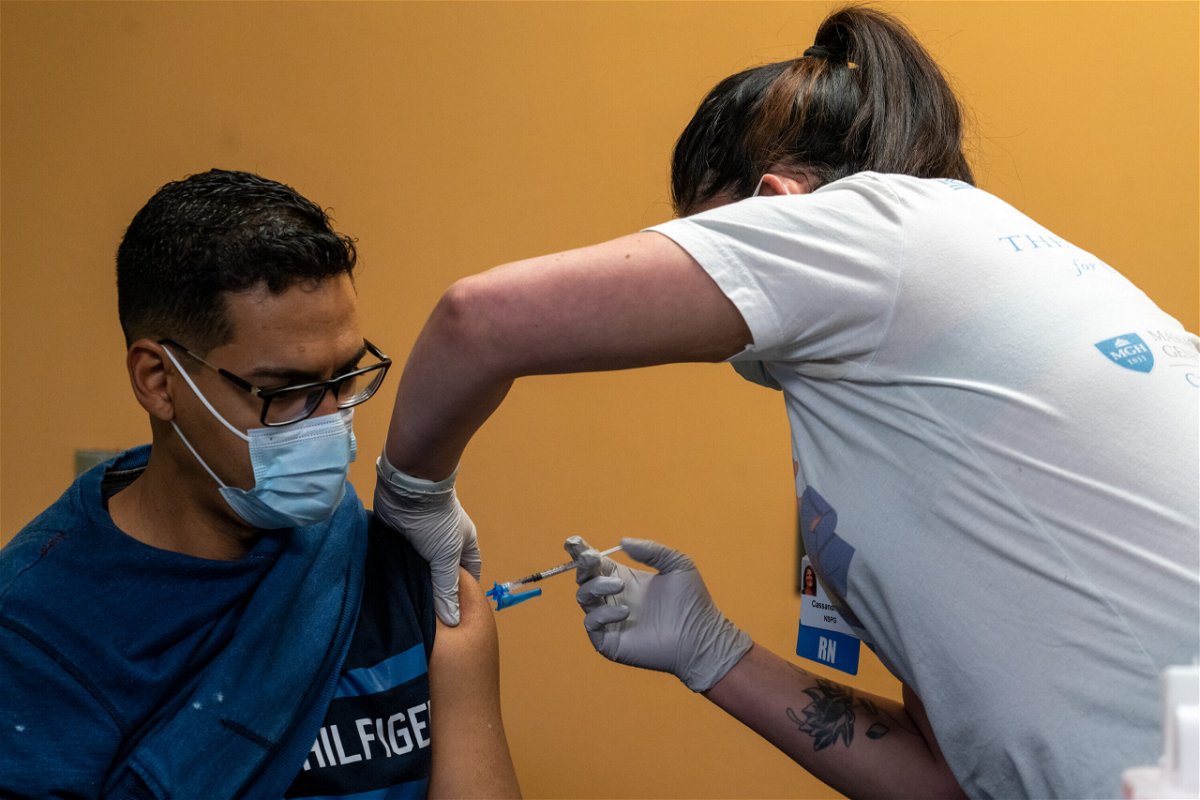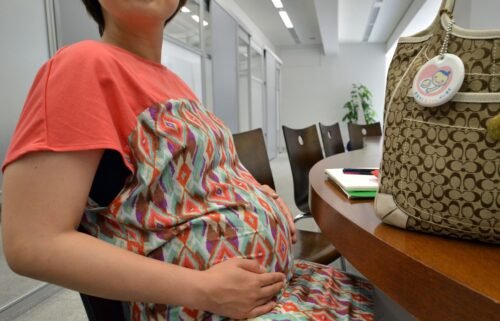Under 60, healthy, vaccinated and boosted? ‘You’re in a pretty good place’ with Covid-19

A healthcare worker administers a dose of the Pfizer-BioNTech Covid-19 vaccine in Peabody
By Elizabeth Cohen, CNN Senior Medical Correspondent
Data obtained by CNN from New York’s largest health-care provider indicates you’re very unlikely to become severely ill with Covid-19 if you’re under age 60, up to date on your Covid-19 vaccines and don’t have underlying health problems, backing up a government plan expected to be announced this week that will ease up on coronavirus restrictions.
If you’re young, healthy and vaccinated, “you’re going to be in a pretty good place,” said Dr. William Schaffner, a vaccine adviser to the US Centers for Disease Control and Prevention. “You’re going to be well-protected.”
The data from Northwell Health shows that of the nearly 2,000 people hospitalized there for Covid-19 in May, June and July, about 80% were over 60. Nearly 90% had an underlying health problem such as hypertension or diabetes.
Vaccination status was also critically important. The vast majority of hospitalized patients were not up to date on their Covid-19 vaccinations. Those who were up to date and still ended up in the hospital were mostly over 65.
This summer, the highly transmissible Omicron BA.5 variant has caused infections to soar, but because Omicron causes milder illness and a large proportion of the country has been vaccinated, previously infected or both, hospitalizations nationwide are lower than at many previous points in the pandemic.
Dr. Jill Kalman, Northwell’s chief medical officer, noted that when Covid patients do end up in the hospital, they fare much better than they once did.
“The mortality rate now is very low: It’s around 2%, and it was around 10 to 12% during Delta,” she said. “And if they do get into the ICU, they’re not staying as long. In the first wave, we were seeing patients in the ICU for 15, 20, 30 days, and it’s a fraction of that now.”
CNN shared the data with CDC Director Dr. Rochelle Walensky, who said it meshed with her recent statements that “we are in a much better place than we were.”
She added that national data from April through June shows hospitalizations were about four times higher among people over 50 compared with younger adults.
CDC to tailor messages to specific groups
Based on CDC documents obtained by CNN, the agency is expected to announce this week that it will get rid of the 6 feet social distancing guidance for the general population and end existing quarantine measures for those who have been exposed to the virus. People who test positive for Covid-19 should still isolate for at least five days, and then continue to take precautions, including wearing a well-fitting mask for another five days.
For other measures, the CDC is expected to tailor guidelines to high-risk groups moreso than earlier in the pandemic.
For example, the new guidance is expected to suggest that the elderly, the immune-compromised and others at high risk of becoming severely ill with Covid-19 should wear masks indoors in about 80% of US counties, whereas for the general population, the agency currently recommends indoor masking for only about half of US counties.
Advice about Covid-19 screening testing also varies by group. The CDC document obtained by CNN indicates the agency will not recommend it for most settings, but will advise that it could be helpful in high-risk congregate settings, such as nursing homes.
Schaffner, a member of the CDC’s Advisory Committee on Immunization Practices, says at this point in the pandemic, it makes sense to do more tailoring of messages.
“When a patient or someone in the community asks me for advice about Covid, the first thing I always say is, ‘Who are you? What’s your vaccination history? What’s your age? What are your underlying comorbidities? Are you caring for someone in a high-risk group?'” he said.
Age and vaccination status predict your chance of being hospitalized with Covid-19
The Northwell data looks at 1,961 patients in its 21 hospitals from May 1 to July 31. The data includes people who were admitted because they had Covid and not patients who were admitted for other reasons and then tested positive for the virus.
Of these hospital patients, 66% were over 70, 15% were in their 60s, and 8% were in their 50s.
Across all ages, 89% of the patients had an underlying health problem such as hypertension, diabetes or coronary artery disease.
Of all patients hospitalized for Covid, 47% had not had a single Covid shot, 21% had had only one or two shots, and 32% were fully vaccinated and boosted. Among that last group, 78% were 65 or older.
Schaffner noted that for the group who ended up in the hospital with Covid-19 despite being up to date on their vaccines, it would be important to know how much time had passed since their last booster, since the efficacy of the mRNA vaccines wanes with time.
“These data show that people who are older and have underlying comorbidities have to be very attentive to their vaccination status, and that if they go indoors or participate in group activities, they should keep their masks on,” he said.
People ages 5 to 50 are up to date if they’ve had two shots of the Pfizer or Moderna vaccine plus a booster. For people over 50, being up to date means two shots and two boosters.
Generally, although young, healthy, vaccinated and boosted people are by and large spared hospitalization, some of them do end up in the hospital, and others become ill enough that they are out of work or school for prolonged periods of time.
CDC has ‘challenging’ data issues
The Northwell data is in some ways more useful than CDC’s national data in that it can link hospital patients to their vaccination status.
“The statistics from Northwell are able to give us a more granular sense of data, some of which we can’t necessarily cross with the national data that we have access to at CDC,” Walensky told CNN.
Walensky has called for improvements to the data that states send to the CDC.
“We have really had to bring our data up to the 21st century and to get us to a place where our systems talk to each other,” she said. “Those data issues are really challenging.”
The-CNN-Wire
™ & © 2022 Cable News Network, Inc., a WarnerMedia Company. All rights reserved.
CNN’s Danielle Herman and Brenda Goodman contributed to this report.



